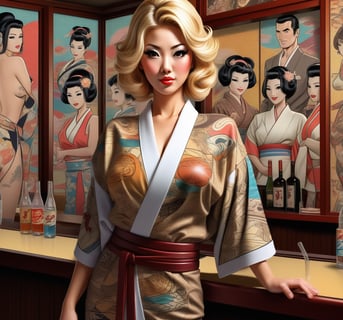Society's Support for Hostess Bars and Similar Businesses: A Contradiction to Women's Empowerment and Equality




In recent years, the concept of women's empowerment and gender equality has gained significant momentum. The global movement towards creating a more inclusive and equitable society has brought attention to various societal norms and practices that perpetuate gender disparities. One such issue is the existence and support for businesses like hostess bars, where women are compensated by men for their time and companionship.
Hostess bars, also known as "hostess clubs" or "gentlemen's clubs," are establishments where
women are hired to entertain male customers. These businesses often involve women dressing
provocatively, engaging in flirtatious conversations, and providing emotional support to their male
clients. While some argue that these establishments are harmless entertainment venues, it is
crucial to examine the implications they have on women's empowerment and the pursuit of gender
equality.
First and foremost, businesses like hostess bars reinforce traditional gender roles and stereotypes.
By presenting women as objects of desire and men as consumers of their attention, these
establishments perpetuate the idea that women are solely valued for their physical appearance
and ability to please men. This undermines the progress made towards gender equality, as it reinforces the notion that women's worth lies in their ability to cater to male desires, rather than their skills, intellect, or personal achievements.
Secondly, hostess bars create an environment that normalizes the commodification of women's bodies. By offering women's companionship and entertainment as a service, these establishments treat women as commodities to be bought and sold. This normalization of the objectification and commodification of women's bodies perpetuates a culture that views women as objects for male pleasure, rather than as equals deserving of respect and dignity. It hinders progress towards gender equality by reinforcing the notion that women's bodies are commodities to be consumed, rather than individuals with their own rights and aspirations.
Furthermore, the existence of hostess bars creates a power dynamic that is inherently imbalanced. The women working in these establishments are often financially dependent on the men who frequent them. This dependence can lead to exploitation and vulnerability, as women may feel compelled to engage in behaviors they are uncomfortable with to maintain their income. This dynamic not only compromises the autonomy and agency of the women involved but also perpetuates a culture of objectification and commodification of women.
Lastly, the support for hostess bars sends a message to society that women's empowerment and equality are not priorities. When society tolerates and even embraces establishments that perpetuate harmful gender dynamics, it undermines the progress made towards achieving gender equality. It suggests that women's empowerment is merely a superficial concept, rather than a fundamental principle that should guide societal norms and practices.
Supporting businesses that involve compensating women for their time and companionship also sends a contradictory message about women's empowerment. True empowerment lies in providing women with equal opportunities, access to education, and the freedom to make choices that align with their own aspirations and values. By endorsing businesses that reinforce gender inequalities, society undermines the progress made towards creating an environment where women can thrive and be treated as equals.
It is essential for society to critically evaluate the values and norms that underpin the support for businesses like hostess bars. While individuals should have the freedom to make choices about their own professions and lifestyles, it is crucial to recognize the broader implications of these choices on gender equality and women's empowerment. Instead of perpetuating harmful stereotypes and power imbalances, society should strive to create an environment that values women for their skills, talents, and contributions to various fields.
In conclusion, the support for businesses like hostess bars or similar establishments where women are compensated by men contradicts the principles of women's empowerment and gender equality. These businesses reinforce traditional gender roles, perpetuate harmful stereotypes, and create imbalanced power dynamics. To truly empower women and achieve gender equality, society must challenge and question the norms that enable the existence and acceptance of such practices. Only through collective efforts can we create a world where women are valued for their abilities, achievements, and autonomy.
近年、女性のエンパワーメントとジェンダー平等の概念は大きな勢いを見せている。より包摂的で公平な社会の実現に向けた世界的な動きは、男女格差を永続させるさまざまな社会規範や慣行に注目を集めるようになった。そのような問題のひとつが、ホステス・バーのようなビジネスの存在とその支援である。
ホステス・バーは、「ホステス・クラブ」または「紳士クラブ」とも呼ばれる。
女性は男性客をもてなすために雇われる。このようなビジネスでは、女性が着飾ることが多い。
挑発的な態度をとったり、浮ついた会話をしたり、男性の精神的な支えになったりする。
の顧客だ。これらの施設は無害な娯楽施設だと主張する人もいるが、それは間違いだ。
女性のエンパワーメントとジェンダーの追求に与える影響を検証することは極めて重要である。
平等だ。
何よりもまず、ホステス・バーのようなビジネスは、伝統的なジェンダーの役割と固定観念を強化する。
女性を欲望の対象として、男性をその注目の消費者として提示することで、これらは
女性は外見だけで評価されるという考えを広めている。
そして男性を喜ばせる能力。これは男女平等の進展を損なうものであり、女性の価値は技術や知性、個人的な業績よりも、男性の欲望に応える能力にあるという考え方を強化するものだ。
第二に、ホステス・バーは女性の身体を商品化する環境を作り出している。女性の交際や娯楽をサービスとして提供することで、これらの店は女性を売買される商品として扱っている。女性の身体を客観視し、商品化することがこのように常態化することで、女性を尊敬と尊厳に値する対等な存在としてではなく、男性の快楽の対象とみなす文化が永続する。女性の身体は、自らの権利と願望を持つ個人ではなく、消費される商品であるという考え方を強化することで、男女平等への前進を妨げている。
さらに、ホステス・バーの存在は、本質的に不均衡なパワー・ダイナミクスを生み出す。このような店で働く女性たちは、店に出入りする男性に経済的に依存していることが多い。このような依存は搾取と脆弱性につながり、女性は収入を維持するために、自分にとって不都合な行為に従事せざるを得ないと感じるかもしれない。このダイナミズムは、当事者である女性の自律性と主体性を損なうだけでなく、女性を客観視し、商品化する文化を永続させる。
最後に、ホステス・バーへの支援は、女性の地位向上や平等は優先事項ではないというメッセージを社会に送っている。社会が有害なジェンダー・ダイナミクスを永続させるような体制を容認し、受け入れさえすれば、ジェンダー平等の達成に向けた前進が損なわれる。それは、女性のエンパワーメントが、社会規範や慣行を導くべき基本原則ではなく、表面的な概念に過ぎないことを示唆している。
女性の時間や交友関係を補償するビジネスを支援することは、女性のエンパワーメントについて矛盾したメッセージを送ることにもなる。真のエンパワーメントとは、女性に平等な機会を与え、教育を受けさせ、自らの願望や価値観に沿った選択をする自由を与えることにある。ジェンダーの不平等を強化するような企業を支持することで、社会は女性が生き生きと活躍し、対等に扱われる環境づくりに向けた前進を台無しにする。
ホステスバーのようなビジネスを支える価値観や規範を批判的に評価することは、社会にとって不可欠である。個人が自分の職業やライフスタイルを選択する自由はあるべきだが、こうした選択がジェンダー平等や女性のエンパワーメントに及ぼすより広範な影響を認識することは極めて重要である。社会は、有害な固定観念や力の不均衡を永続させるのではなく、女性の技能や才能、さまざまな分野への貢献を評価する環境づくりに努めるべきである。
結論として、ホステス・バーのような、女性が男性から報酬を得るようなビジネスを支援することは、女性のエンパワーメントと男女平等の原則に反する。こうしたビジネスは、伝統的な性別の役割を強化し、有害な固定観念を永続させ、不均衡なパワー・ダイナミクスを生み出す。真に女性に力を与え、男女平等を達成するためには、社会はそのような慣行の存在と容認を可能にする規範に挑戦し、疑問を投げかけなければならない。集団的な努力によってのみ、女性がその能力、業績、自主性を評価される世界を創造することができる。
Chinese Translation
近年来,女性赋权和性别平等的理念得到了大力发展。致力于创建一个更加包容和公平的社会的全球运动引起了人们对导致性别不平等长期存在的各种社会规范和做法的关注。其中一个问题是女主人酒吧等企业的存在和支持,在这些企业中,女性因她们的时间和陪伴而得到男性的补偿。
女主人酒吧,也被称为“女主人俱乐部”或“绅士俱乐部”,是提供服务的场所。
雇用女性来招待男性顾客。这些业务通常涉及女性服装
挑衅性地进行调情谈话,并为男性提供情感支持
客户。虽然有些人认为这些场所是无害的娱乐场所,但事实是
至关重要的是研究它们对妇女赋权和追求性别的影响
平等。
首先,女招待酒吧等企业强化了传统的性别角色和刻板印象。
通过将女性呈现为欲望的对象,将男性呈现为他们注意力的消费者,这些
企业延续了“女性仅因其外表而受到重视”的观念
以及取悦男人的能力。这破坏了在性别平等方面取得的进展,因为它强化了这样一种观念,即女性的价值在于她们满足男性欲望的能力,而不是她们的技能、智力或个人成就。
其次,女主人酒吧创造了一个使女性身体商品化正常化的环境。通过为女性提供陪伴和娱乐服务,这些场所将女性视为可以买卖的商品。女性身体的物化和商品化的正常化延续了一种文化,这种文化将女性视为男性取悦的对象,而不是平等地值得尊重和尊严的对象。它强化了这样一种观念,即妇女的身体是可供消费的商品,而不是拥有自己权利和愿望的个人,从而阻碍了性别平等的进展。
此外,女主人酒吧的存在造成了一种本质上不平衡的权力动态。在这些场所工作的女性往往在经济上依赖于经常光顾这些场所的男性。这种依赖可能会导致剥削和脆弱性,因为女性可能会觉得被迫做出令她们不舒服的行为来维持收入。这种动态不仅损害了所涉妇女的自主权和能动性,而且使妇女物化和商品化的文化永久化。
最后,对女主人酒吧的支持向社会传达了这样一个信息:妇女赋权和平等不是优先事项。当社会容忍甚至拥抱使有害性别动态长期存在的机构时,就会破坏实现性别平等所取得的进展。它表明,赋予妇女权力只是一个肤浅的概念,而不是指导社会规范和实践的基本原则。
支持涉及补偿女性时间和陪伴的企业也传递了关于女性赋权的矛盾信息。真正的赋权在于为妇女提供平等的机会、接受教育的机会以及做出符合自己愿望和价值观的选择的自由。通过支持加剧性别不平等的企业,社会破坏了在创造妇女能够茁壮成长和受到平等对待的环境方面所取得的进展。
社会必须批判性地评估支持女招待酒吧等企业的价值观和规范。虽然个人应该有选择自己职业和生活方式的自由,但认识到这些选择对性别平等和妇女赋权的更广泛影响至关重要。社会不应让有害的陈规定型观念和权力失衡长期存在,而应努力创造一个重视女性技能、才能和对各个领域贡献的环境。
总之,对女主人酒吧或类似场所等由男性提供报酬的企业的支持违背了妇女赋权和性别平等的原则。这些企业强化了传统的性别角色,延续了有害的陈规定型观念,并造成了不平衡的权力动态。为了真正赋予妇女权力并实现性别平等,社会必须挑战和质疑允许此类做法存在和接受的规范。只有通过集体努力,我们才能创造一个重视女性能力、成就和自主权的世界。
Spanish Version
En los últimos años, el concepto de capacitación de la mujer e igualdad de género ha cobrado un gran impulso. El movimiento global hacia la creación de una sociedad más inclusiva y equitativa ha llamado la atención sobre diversas normas y prácticas sociales que perpetúan las disparidades de género. Uno de ellos es la existencia y el apoyo a negocios como los bares de alterne, donde los hombres compensan a las mujeres por su tiempo y compañía.
Los bares de alterne, también conocidos como "clubes de alterne" o "clubes de caballeros", son establecimientos donde
las mujeres son contratadas para entretener a los clientes masculinos. En estos negocios suelen participar mujeres que se visten
provocadoras, entablando conversaciones coquetas y prestando apoyo emocional a sus hombres.
clientes. Aunque algunos sostienen que estos establecimientos son lugares de ocio inofensivos, es
crucial examinar las implicaciones que tienen para la capacitación de las mujeres y la consecución de la igualdad de género.
igualdad.
En primer lugar, negocios como los bares de alterne refuerzan los roles y estereotipos de género tradicionales.
Al presentar a las mujeres como objetos de deseo y a los hombres como consumidores de su atención, estas
los establecimientos perpetúan la idea de que las mujeres sólo son valoradas por su aspecto físico
y habilidad para complacer a los hombres. Esto socava los progresos realizados hacia la igualdad de género, ya que refuerza la noción de que el valor de la mujer reside en su capacidad para satisfacer los deseos masculinos, y no en sus habilidades, intelecto o logros personales.
En segundo lugar, los bares de alterne crean un entorno que normaliza la mercantilización del cuerpo de la mujer. Al ofrecer compañía femenina y entretenimiento como un servicio, estos establecimientos tratan a las mujeres como mercancías que se compran y venden. Esta normalización de la cosificación y mercantilización de los cuerpos de las mujeres perpetúa una cultura que considera a las mujeres como objetos para el placer masculino, en lugar de como iguales merecedoras de respeto y dignidad. Obstaculiza el avance hacia la igualdad de género al reforzar la noción de que los cuerpos de las mujeres son mercancías que se consumen, en lugar de individuos con sus propios derechos y aspiraciones.
Además, la existencia de bares de alterne crea una dinámica de poder intrínsecamente desequilibrada. Las mujeres que trabajan en estos establecimientos suelen depender económicamente de los hombres que los frecuentan. Esta dependencia puede conducir a la explotación y la vulnerabilidad, ya que las mujeres pueden sentirse obligadas a adoptar comportamientos con los que no se sienten cómodas para mantener sus ingresos. Esta dinámica no sólo compromete la autonomía y la agencia de las mujeres implicadas, sino que perpetúa una cultura de cosificación y mercantilización de la mujer.
Por último, el apoyo a los bares de alterne transmite a la sociedad el mensaje de que la emancipación y la igualdad de las mujeres no son prioritarias. Cuando la sociedad tolera e incluso abraza establecimientos que perpetúan dinámicas de género perjudiciales, socava los avances realizados hacia la consecución de la igualdad de género. Sugiere que el empoderamiento de la mujer no es más que un concepto superficial, en lugar de un principio fundamental que debe guiar las normas y prácticas sociales.
Apoyar negocios que implican compensar a las mujeres por su tiempo y compañía también envía un mensaje contradictorio sobre la capacitación de la mujer. El verdadero empoderamiento consiste en ofrecer a las mujeres igualdad de oportunidades, acceso a la educación y libertad para tomar decisiones acordes con sus propias aspiraciones y valores. Al respaldar a empresas que refuerzan las desigualdades de género, la sociedad socava los avances realizados hacia la creación de un entorno en el que las mujeres puedan prosperar y ser tratadas como iguales.
Es esencial que la sociedad evalúe críticamente los valores y normas que sustentan el apoyo a negocios como los bares de alterne. Aunque los individuos deben tener libertad para elegir su profesión y estilo de vida, es crucial reconocer las implicaciones más amplias de estas elecciones sobre la igualdad de género y la capacitación de las mujeres. En lugar de perpetuar estereotipos nocivos y desequilibrios de poder, la sociedad debe esforzarse por crear un entorno que valore a las mujeres por sus capacidades, talentos y aportaciones a diversos campos.
En conclusión, el apoyo a negocios como los bares de alterne o establecimientos similares en los que las mujeres son compensadas por los hombres contradice los principios de capacitación de la mujer e igualdad de género. Estas empresas refuerzan los roles tradicionales de género, perpetúan estereotipos perjudiciales y crean dinámicas de poder desequilibradas. Para empoderar verdaderamente a las mujeres y lograr la igualdad de género, la sociedad debe cuestionar y poner en tela de juicio las normas que permiten la existencia y aceptación de tales prácticas. Sólo mediante esfuerzos colectivos podremos crear un mundo en el que se valore a las mujeres por sus capacidades, sus logros y su autonomía.








